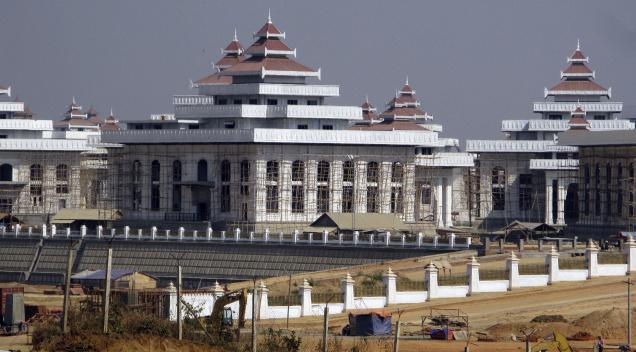(Editorial) – On March 30, Burma officially vacated the title of the world’s only purely military dictatorship. Yet, it has now been 100 days since ex-General Thein Sein morphed into President Thein Sein, and the question must be asked what happened to the voices of the vast majority of parliamentarians elected last November, or even that of the newly enshrined president?
parliament-buildingDespite the 498 elected parliamentarians in both national houses, state policy under the brief tenure of President Thein Sein appears to be dominated by a select inner cabinet numbering some 40 high-ranking ministers, most of whom are recent high-ranking retirees of Burma’s armed forces. This regrouping of power within a tightly centralized structure was further on display with the recent announcement that such ministries as health, education and religion now fall under the purview of the central government, as opposed to operating under state legislatures.

Left with precious little to do other than await verdicts handed down to them from the inner cabinet, Parliament has thus far failed to assert itself on the Burmese political landscape in any discernable fashion, with motions ranging from amnesty for political prisoners to alternative solutions in ending ethnic conflicts to the environmental impact of ongoing dam projects all meeting with de facto vetoes from members of Burma’s ministerial elite.
But can President Thein Sein really be held responsible? While the knee jerk reaction is to throw the book at him as nominal head of state, the truth is that it is entirely unclear just how much weight the president’s opinion carries in central decision-making processes. Significant issues at stake include the handling of ongoing ethnic insurgencies as well as popular opposition leader Aung San Suu Kyi and her followers.
Nevertheless, whether President Thein Sein is more of puppet or puppeteer, the government is pursuing a policy of economic and financial reform unarguably aimed at quelling the specter of popular discontent stemming from a lack of political reform. Focal points of the strategy include poverty eradication, and exchange rate and monetary policy. Already, state worker pensioners have learned of a raise in their income from the state, further evidence of fiscal policy seeking to preempt widespread political upheaval via economic machinations. Additionally, there is speculation that the cabinet will turn to its estimated US$ 3.7 billion in reserve to bolster small businesses.
There are undoubtedly positive outcomes that could be realized with investment in Burma’s broader population, and this could in turn raise the profile of the president and the façade of parliament––especially as such measures could have been, but were not, undertaken in the preceding decades. However, this misses the point of the election of nearly 500 legislators, the end product of a 15-year National Convention process that promised political reform.
In a world where economics increasingly dwarfs politics in mature democratic societies, dictating policy much as the political axis once did in a more ideologically driven age––Burma stands as a stark counter case. While no one will contest the fact that Burma has plenty of room for improvement in areas of infrastructure and development, the construction of physical bridges can in no way alone span the gaping fissure menacing Burma’s political arena.
The lack of political reform has additionally leant more credence to the views of those that refuse to engage in the process. Why should they take part? What benefit is it to them? As such, would those invested in the parliamentary process not be better off actively incorporating elected parliamentarians into policy-making processes? Stifling the naysayers? The option is on the table.
But, if there is one tentative conclusion to be drawn from the 100 days of relative silence and inactivity characterizing parliamentarians as well as the president, Burma’s ultimate powerbrokers continue to reign largely out of sight, unaccountable and beyond the reaches of the Burmese population.



